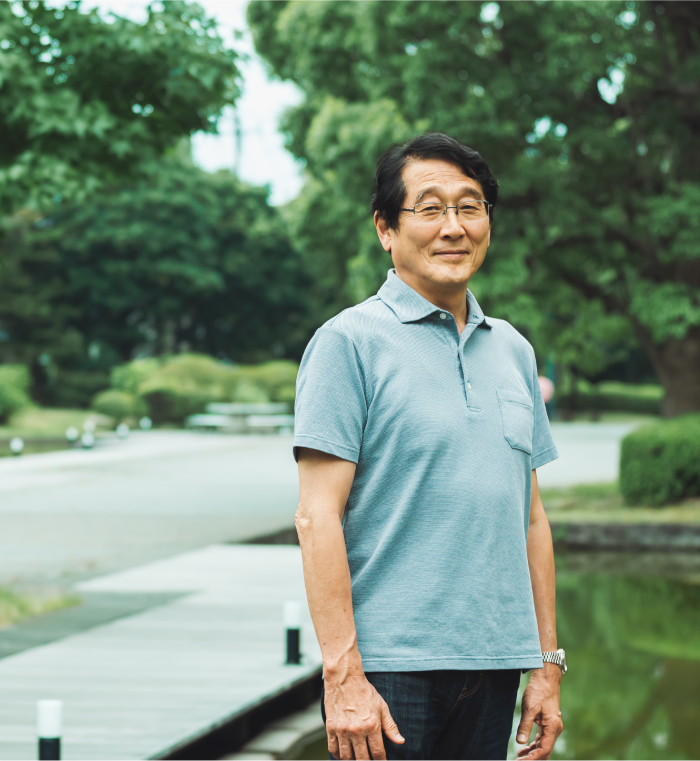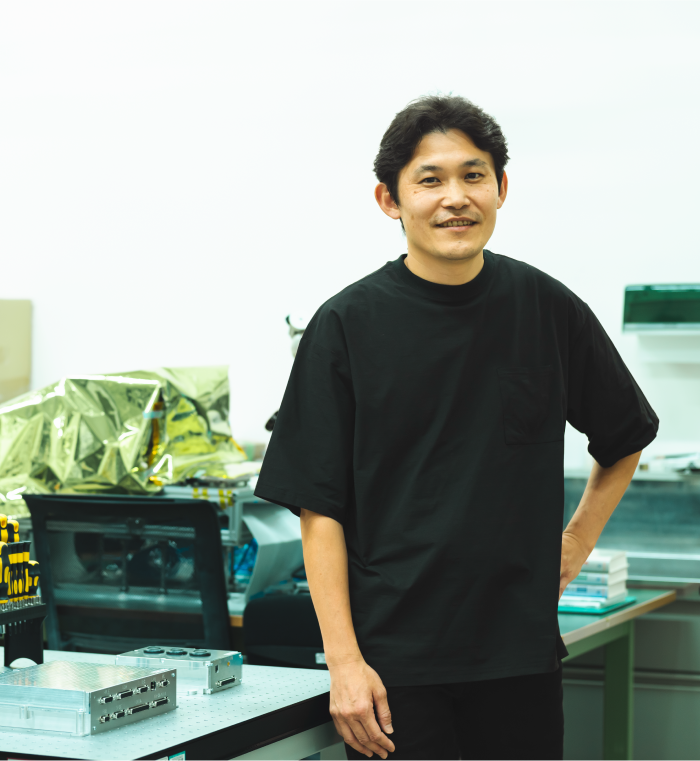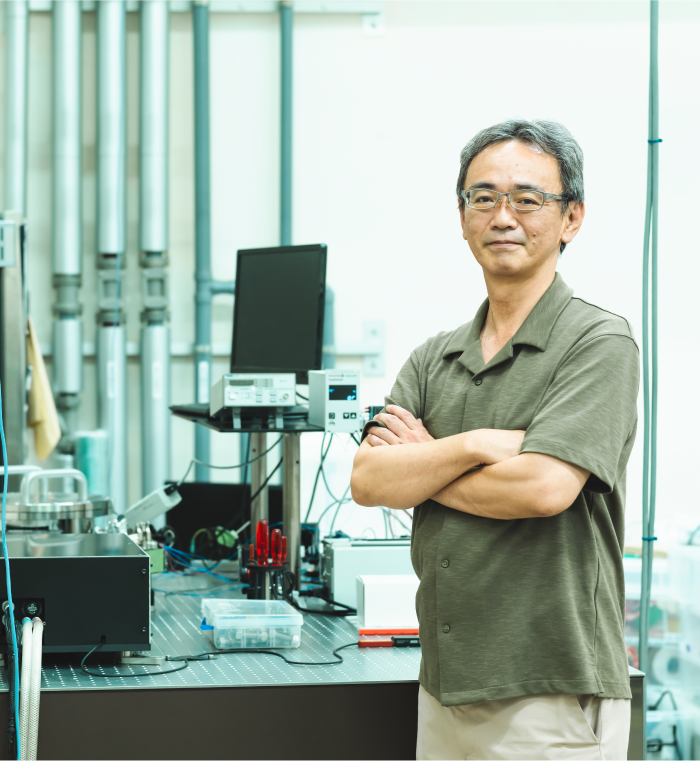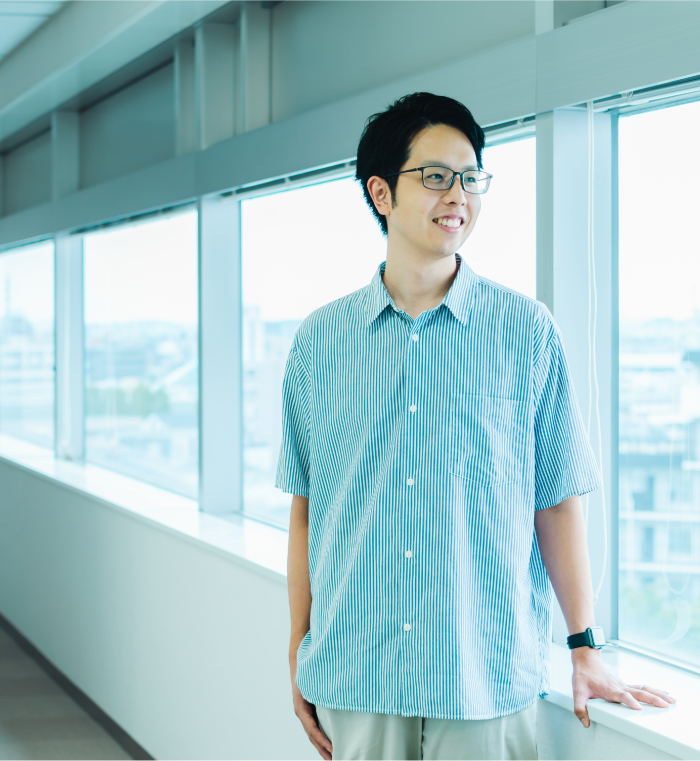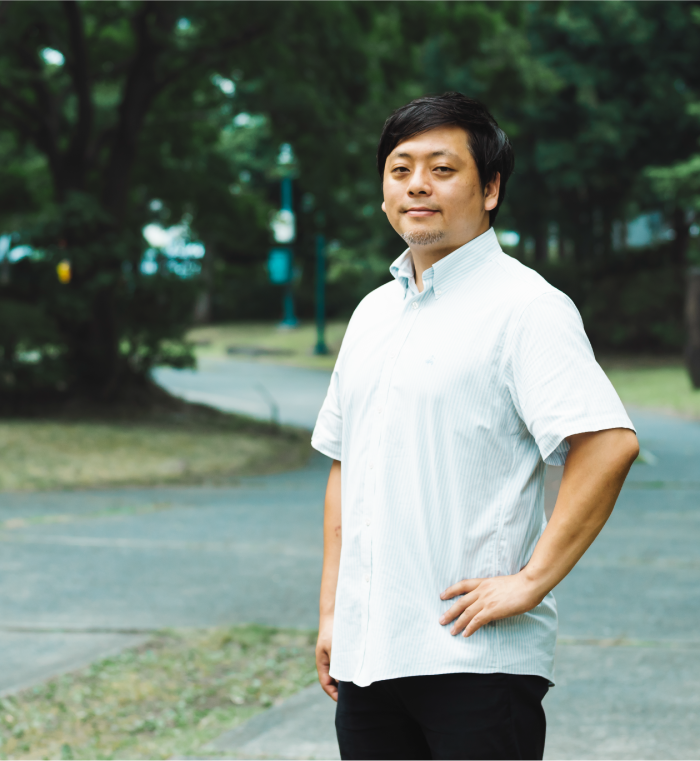
Interview
私たちの技術を、宇宙へ
わが子と立ち合う日を
夢見て、挑み続ける
Our technology, to space. Dreaming of the day I stand alongside my children, continuing the challenge
板谷 優輝
Yuki Itaya
技術開発部
エンジニア
Technical Development Team
Engineer

大学・大学院では航空宇宙工学を専攻し、デブリに関する研究室に所属。2018年新卒でスカパーJSATに入社。衛星管制センターにて「通信衛星の監視」「監視インフラの構築」に従事。さらにその後本社に移り、「静止通信衛星の調達プロジェクト」や「衛星通信サービスの設計」など、技術者として経験を重ねる。それと同時に、当時Orbital Lasers代表福島が立ち上げたスペースデブリ除去のプロジェクト(スカパーJSAT内のスタートアッププログラム)参画を志願。2024年1月Orbital Lasers設立メンバーとしてジョインする。プライベートでは2児の父。
I majored in aerospace engineering during my undergraduate and graduate years and was part of a lab focusing on debris research. I joined SKY Perfect JSAT as a new graduate in 2018, where I worked in the satellite control center, engaged in "monitoring communication satellites" and "building monitoring infrastructure." Later, I transferred to the headquarters and gained experience in various roles such as "procurement projects for geostationary communication satellites" and "designing satellite communication services." Around the same time, I volunteered to participate in the space debris removal project led by Orbital Lasers' founder, Fukushima, as part of a startup program within SKY Perfect JSAT. In January 2024, I joined Orbital Lasers as a founding member. Privately, I am a father of two.

Q1. 学生時代はどんな分野を研究していたか?
Q1. What field did you research during your student years?
宇宙でも「ゴミ問題」が存在することを知った高校時代。
大学・大学院では、デブリ研究一色の日々
In high school, I learned that even in space, there was a "garbage problem." My university and graduate days were filled with debris research.
「宇宙」には、漠然とですが子どもの頃から憧れを抱いていました。高校時代には、九州大学のオープンキャンパスに参加し、その際に、スペースデブリ研究の第一人者である教授と出会います。その教授のお話を伺った時に「宇宙にもゴミ問題があるのか!」と目から鱗が落ちて、スペースデブリに一気に関心を寄せるように。高校卒業後は同大学に入学し、その教授の研究室に入ることになるのですが、そこでは、デブリの軌道計算やマッピング(デブリが宇宙空間のどこに存在しているのか)などの研究に励みました。まさに、デブリ一色の学生生活でしたが、私自身が追求したい分野でしたので、とにかく夢中でした。
I had always felt a vague admiration for "space" since childhood. During high school, I attended an open campus event at Kyushu University, where I met a professor who was a leading authority in space debris research. When I heard him speak, I was shocked to learn, "There's a garbage problem in space too!" and I became deeply interested in space debris. After graduating high school, I enrolled in that university and joined the professor’s research lab. There, I worked on research related to debris orbit calculations and mapping (tracking where debris exists in space). My student life revolved entirely around debris research, but I was fully engrossed since it was the field I wanted to pursue.
Q2. Orbital Lasers に入社したキッカケは?
Q2. What inspired you to join Orbital Lasers?
「スペースデブリ除去」の
最先端にいるOrbital Lasersで
技術者として大きなチャレンジをしたい
I wanted to take on a major challenge as an engineer at Orbital Lasers, a company at the forefront of "space debris removal.
就職活動時も「デブリ問題」に関心はあったものの、当時はデブリ除去が事業化できるイメージがあまり湧いていませんでした。そこでまずは「宇宙事業に広く携わろう」という想いから、スカパーJSATに入社します。しかし入社後、偶然にも現Orbital Lasers代表の福島と出会い、「宇宙用レーザーによるデブリ除去」の構想を聞き、その瞬間にデブリ問題への熱が一気に再燃したんです。まもなくして、福島がスカパーJSAT内にて「デブリ除去プロジェクト」を立ち上げ、そのタイミングで私から志願し、参画することに。最初は兼務からスタートし、2024年のOrbital Lasers設立以降は、川崎オフィスでフルコミットしています。学生時代、指導教授が「デブリ問題を解決しないと宇宙開発は行き詰まる」とよく話していたのを思い出しますが、Orbital Lasersはまさにその課題解決の最前線に立っていると感じています。
Even during my job search, I was interested in the "debris problem," but at the time, I couldn't quite see how debris removal could become a viable business. So, I decided to join SKY Perfect JSAT to broadly involve myself in the space industry. However, after joining, I happened to meet Fukushima, now the CEO of Orbital Lasers, who shared his vision of "debris removal using space lasers." In that instant, my passion for the debris problem was reignited. Shortly after, Fukushima launched the "Debris Removal Project" within SKY Perfect JSAT, and I immediately volunteered to join. Initially, I worked concurrently with other roles, but since the establishment of Orbital Lasers in 2024, I've been fully committed to the project at the Kawasaki office. I often recall my former professor’s words: "If we don't solve the debris problem, space development will come to a standstill." I feel that Orbital Lasers is truly at the forefront of addressing this challenge.
Q3. 社内の雰囲気は?
Q3. What is the atmosphere like within the company?
さまざまな分野のスペシャリストと当たり前のように議論ができる。
恵まれた環境で、毎日が学びに満ちている
We can easily engage in discussions with specialists from various fields. Every day is a learning experience in this enriched environment.
社内には、私と同世代の技術者はもちろん、豊富な経験を持つ先輩技術者も多く在籍しています。衛星の開発・打ち上げ・運用を手がけた方や、JAXAでプロマネを経験された方、国家規模のプロジェクトに従事してきた方などが、当たり前のように、すぐそばで働いているんです。そうした先輩方と膝をつき合わせて議論をしたり、相談に乗っていただく機会も多く、毎日が学びに満ちています。また私が担当する業務では、川崎のオフィスのメンバーだけでなく、理化学研究所在籍のメンバーともコミュニケーションを図ることもありますが、どの分野の方もフラットで接しやすく、立場や年齢など関係なく、互いに意見やアイデアを伝えやすい組織だと感じます。
In the company, there are many engineers around my age, as well as senior engineers with extensive experience. People who have worked on satellite development, launches, and operations, those with project management experience at JAXA, and others who have been involved in large-scale national projects are working right next to me, as if it's the most natural thing. I often get opportunities to sit down and discuss or seek advice from these senior engineers, making every day a learning experience. In addition, in the tasks I handle, I communicate not only with members at the Kawasaki office but also with those from RIKEN. Regardless of their field, everyone is approachable and flat in terms of hierarchy, making it easy to share opinions and ideas regardless of age or position.
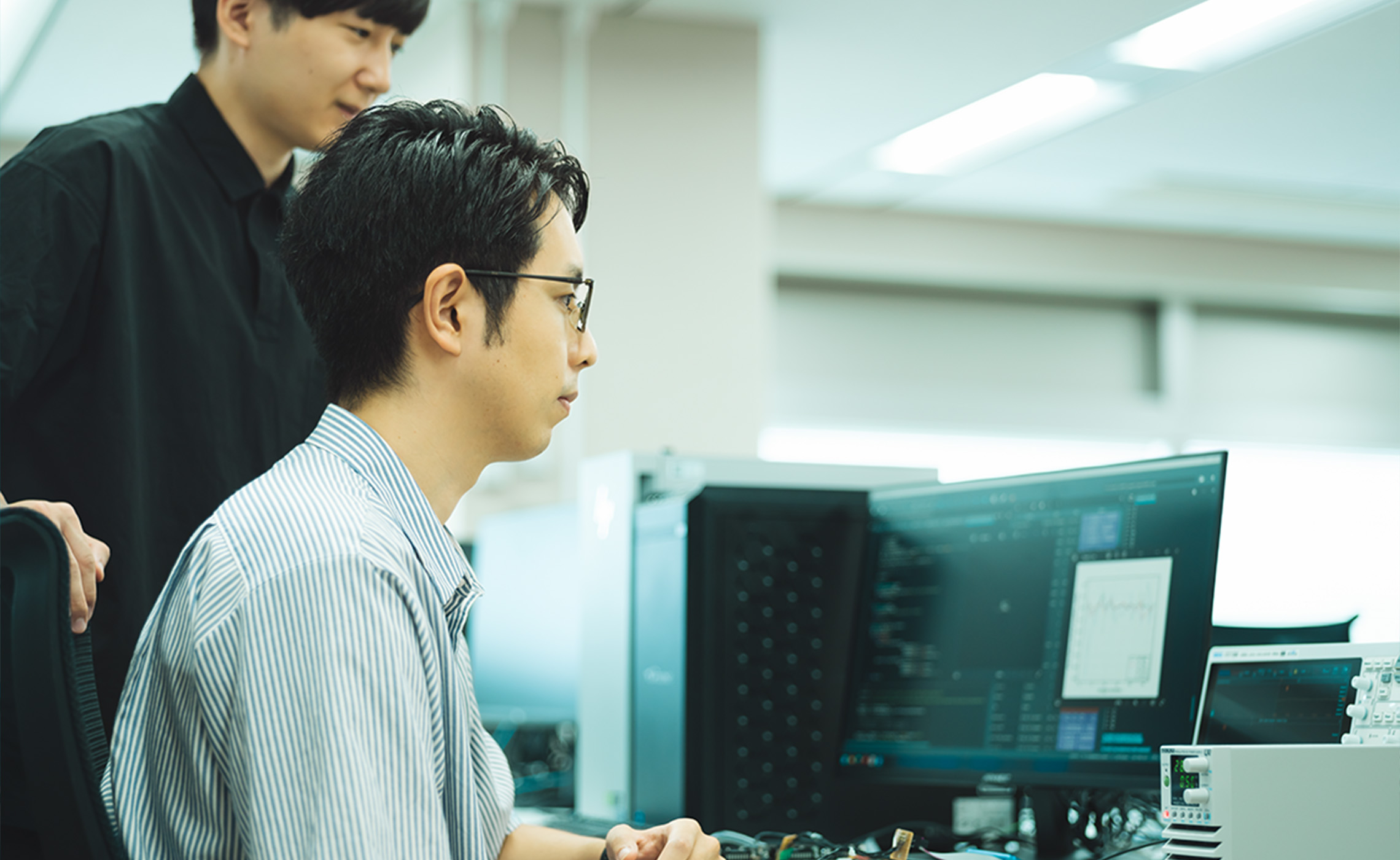
Q4. 現在の業務内容について
Q4. What are your current responsibilities?
「レーザーで宇宙を拓く」が、着実に
カタチになっていく。開発フェーズが進むたびに
大きなモチベーションが湧いてくる
"Our goal to pioneer space with lasers" is steadily taking shape. Every time we advance to a new development phase, my motivation surges.
Orbital Lasersが展開する「スペースデブリ除去」と「衛星ライダー」、このふたつの事業において、衛星の設計開発やスケジュール調整、連携大学との共同研究のマネージメント、さらには社内インフラの整備など、多岐にわたる業務を担っています。同じ目標を共有する仲間たちとの仕事は、どんな業務であっても、スピーディーかつダイナミックに物事が進行していくので、日々、充実感に満ちています。加えて、開発プロジェクトでは、次のフェーズに進んだ際、社内で進捗共有を受けるたびに、Orbital Lasersが掲げる「レーザーで宇宙を拓く」という目標が、一歩ずつ着実にカタチになっていると実感できるので、大きくモチベーションが上がりますね。
At Orbital Lasers, I am involved in the design and development of satellites, schedule coordination, managing joint research with partner universities, and even handling internal infrastructure, in two key business areas: "space debris removal" and "satellite lidar." Working alongside colleagues who share the same goals makes any task proceed quickly and dynamically, filling my daily work with a sense of fulfillment. Moreover, in the development projects, whenever we share progress internally upon moving to the next phase, I can feel that Orbital Lasers' mission to "pioneer space with lasers" is becoming a reality step by step, which greatly boosts my motivation.
Q5. どんな人と一緒に働きたいか?
Q5. What kind of people do you want to work with?
どんな時も、宇宙へのロマンを忘れずに。
Orbital Lasersの技術力とメンバーを信じて立ち向かう
Those who never lose their sense of wonder for space and trust in the capabilities of Orbital Lasers and its members.
「遠隔からレーザーでデブリを捕捉し除去する」というOrbital Lasers独自の技術に共感し、その可能性に胸を躍らせられる方は、この会社に向いていると思います。私自身、この構想を初めて聞いたときに、大きく心を動かされました。とはいえ日々の業務では、さまざまな制限や制約があり、スケジュールや予算も有限です。誰も答えがわからない課題に直面することも少なくありません。しかし、そんな時こそ、宇宙へのロマンを忘れずに、その想いをモチベーションに変えられる方であれば、Orbital Lasersで、きっと活躍できると思います。今私には、幼いふたりの子どもがいますが、「子どもたちと一緒に、衛星の打ち上げに立ち合う日」を思い描きながら働いています。さらに技術者としては、いつか「衛星の開発から打ち上げ、運用まで、すべてのフェーズに携わる」という、大きなロマンも抱いているんです。
I think Orbital Lasers is the right place for those who resonate with the company's unique technology to "capture and remove debris with lasers from a distance" and feel excited about its potential. I was deeply moved when I first heard about this concept myself. However, the day-to-day work comes with various restrictions and limitations, including finite schedules and budgets. We often face challenges where there are no clear answers. But, for those who can turn their passion for space into motivation during such times, I believe they will thrive at Orbital Lasers. I currently have two young children, and I work with the dream of one day standing with them to witness a satellite launch. As an engineer, I also carry the grand ambition of one day being involved in all phases of a satellite's journey—from development to launch and operation.

